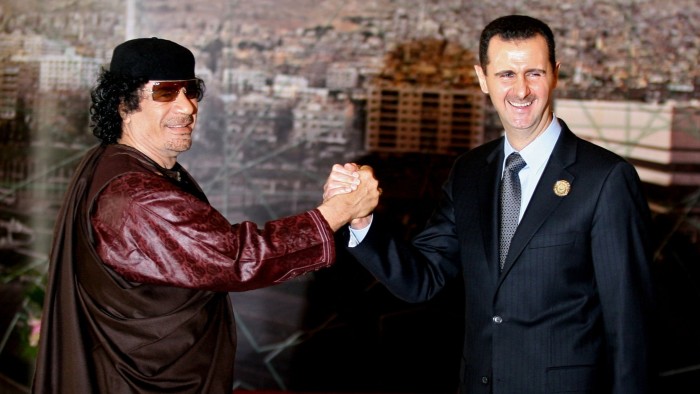Unlock the White House Watch newsletter for free
Your guide to what the 2024 US election means for Washington and the world
The soft voice helped. So did the weak chin and gawky height. Throw in the medical training in London, as well as the marriage to an urbane local, and it is small wonder that people were disarmed. Bashar al-Assad was no one’s idea of a despot. And when he freed some of Syria’s political prisoners in 2000, the west had more to go on than “vibes”. France gave him the Legion of Honour soon after.
In retrospect, the best that can be said about the courting of Assad is that it wasn’t the west’s worst misjudgment of a dictator as the millennium got going. Vladimir Putin was another “guy we can do business with”. So was Muammer Gaddafi, despite once being so synonymous with tyranny in the western imagination that Arsenal players referred to their strict coach as “Gaddafi”. In all three of these cases, the free world trusted a leader for what even at the time seemed tenuous reasons. In all three, it ended up in a direct or indirect war with them.
Why does this keep happening? How does the trope of the rational strongman so often fool the west? (Saddam Hussein is another example of friend-turned-mortal-foe.) First, let us stipulate that this is a world of dire options. Liberal societies have survived by backing lesser against greater evils: Soviets against Nazis, mujahideen against Soviets, Ba’athists against jihadis. But this can’t explain the depth of recent credulity. European governments thought Putin was too sensible to invade Ukraine even as he lined the border with troops three winters ago. Assad was indulged long after he had smothered the tentative reforms of the Damascus Spring in 2001.
Part of the naïveté is generational. At a formative stage in their careers, the leaders who fell for Assad had seen Mikhail Gorbachev and then FW de Klerk wind down their own autocracies to face westward, or at least outward. We now recognise this as exceptional, almost freakish statesmanship. A cohort of western decision makers saw it as a transferable template. The idea of a self-euthanising dictatorship, a regime that will give up the fight if you just coax it along, took hold. Forged in disappointment, especially the dashed hopes of the Arab Spring, the coming batch of western politicians, diplomats and spies won’t be so innocent.
Another reason the west gets caught out is that autocrats tend to harden over time. As power intoxicates them, courtiers dial up the praise and access to reliable information dries up, executive over-reach becomes ever likelier. A long-serving despot is one with lots of enemies, too, and therefore no alternative to holding office that doesn’t invite death. (Or exile, which brings its own insecurities.) In other words, the west was right about Assad and Putin, until it wasn’t. It is now right to cultivate Saudi Crown Prince Mohammed bin Salman. Nothing could be more pragmatic. In 2030, though?
Since the end of the cold war, each of the strongmen with whom the free world has fought was a decade or more into their rule: Saddam in 1991, Gaddafi in 2011, Assad in 2017, Putin since 2022 and, depending on how we date his first direct confrontation with the west, perhaps even Slobodan Milosevic in 1999. As a cheerful Christmas thought, Xi Jinping has led China for 12 years.
The degeneration of autocrats over time: once we recognise this pattern, even some of the initial attempts at appeasement between the world wars start to seem understandable, never mind the Assad flattery of the early 2000s. Churchill praised “gentle” Mussolini in 1927, but faulting him for this rather assumes that Il Duce was the same man then as he was in 1940 — that there is such a thing as someone’s essential character. Conceivably, there isn’t. Part of Assad on the eve of the millennium really was a timid ophthalmologist with whom business was doable. The mistake wasn’t the attempt, but the head in the sand when all hope was gone.
If Assad’s life teaches the west anything, it is this: personal exposure to the free world need not endear someone to it. Too much hope was put in his British connection, just as too much was read into Putin’s home town being St Petersburg, Russia’s portal to democratic Europe, where he chose to host Tony Blair in 2000. For a civilisation so often accused of self-doubt, even self-loathing, the west has a touching faith that mere contact with it will charm and defang potential enemies. This confidence has survived the fact that Ayatollah Khomeini lived near Paris, that Lenin was Swiss-resident before turning Russia upside down and that every mischief-maker from Marx onwards seems to have done a London stint. If anything, contact sharpens the sense of difference.
In the end, if it is to be Abu Mohammad al-Jolani who runs Syria, will the west break the cycle of initial overconfidence in a leader, later disappointment and ultimate conflict? Or is a certain amount of naïveté just part of what it is to be liberal? At its core, liberalism’s claim is that human nature, if hemmed in with some rules and institutions, is good enough to produce a functioning society without constant coercion. From there, it isn’t such a leap to seeing almost any individual as, if not good, then redeemable. The question isn’t why the west falls for the likes of Assad, Putin and perhaps in time Jolani, but how it could ever do otherwise.
Read the full article here




